
In Memory of James William Birthrong
March 30, 2022by Becca Tzigany
12 May 2022
According to the Bardo Thötröl (The Tibetan Book of the Dead), when we die, we drop our physical body but continue our awareness in the mental body. In the days after death, the mind can be confused, trying to command a body that no longer exists and to live in a world through the mists of memory. This is the situation in which I found my partner James for 3 days after he passed: wandering, confused, restless. Our friend Sandy, an accomplished Buddhist meditator, wrote me that she had a lucid vision of James driving around in his trickshaw, wanting to go to his old favorite restaurants, but they were obscured in fog. The street was missing paving stones, and businesses were closed. Anguish over his state added to my grief of missing him.
I started the Tibetan Tantric prayers to facilitate his death process in the hospital, and continued them at home. In the dead of night, I sat for hours at my altar. Burning tears carried my sorrow. I lit candles, purified the space with incense, sat and listened to the night rains on the roof. My world was weeping.
Every evening, I opened the book to recite the prayers to help James along “the bardo’s dangerous pathway”. Bardo means gap, and the bardos are allegedly the stages we pass through after death. The advanced teachings of Vajrayana (Tibetan Tantric) Buddhism can be applied through the death practices, and I had done them before for my father and others for the full 49 days. The subtitle of the Bardo Thötröl is The Great Liberation through Hearing in the Bardo. It claims that when all the illusions of this Earthly existence are gone, it is easier to attain enlightenment there, but we, as supporters still on Earth, have to shout at the dead so they pay attention. So every night, I rang my singing bowl and bellowed at James. Sometimes friends joined in, and we had a chorus, “James! Listen without distraction!”
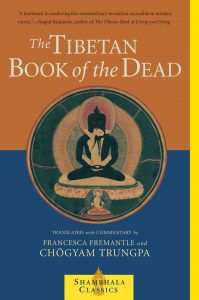
The Bardo Thötröl is a practical guide to the progression of the soul, constantly reminding the one departed: “Everything you see is your own projection! Everything you hear is your own projection!” In that way, it is a hallucinatory realm, and it could be argued that what I relate here are my own hallucinations. These mental projections appear as gods or buddhas, with their consort dakinis, each pair representing a direction, color, quality of mind, and attributes (for example, negative emotions like fear, guilt, or pride). The compassionate deities offer the soul a chance to resolve the karma it has brought along.
If the deceased does not receive the compassionate guidance, s/he falls ever downward, to encounter further mental projections: wrathful deities, fires to burn away karma, devouring demons who (it is rumored) can hack you to pieces … pointedly a delusion, given that the soul has lost the body and cannot die.
I had been chanting James through the realms of the benevolent buddhas, and the wrathful ones were just around the bend.
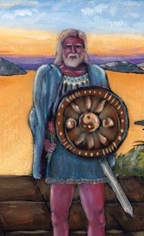
Mars in “Center Stage” by JG Bertrand, from The Pillow Book of Venus and Her Lover ~ Legendary Passions Brought to Life
My Mars man, who had lived his whole life as the Warrior, was accustomed to getting his lessons through pain. Due to his being born with birth defects + subsequent botched operations, he had a complex relationship with his pain body, as well as a warrior’s stoic drive to overcome tribulations. In my candlelit nights at the altar, I pleaded with him to leave that behind and surrender to the blissful existence of his own Buddha nature. “The superior man recognizes his own projections, and merging with non-duality, becomes a buddha.”1
Apparently, at any stage, from before the moment of death and onwards, we can claim our essential nature, if we do not succumb to the unconscious tendencies of the mind. We can recognize our light bodies: “pure and clear yet hard to discern, luminous and brilliant, with terrifying brightness, shimmering like a mirage on a plain in spring. Do not be afraid of it, do not be bewildered. This is the natural radiance of your own dharmatā [the true nature of reality]; therefore, recognize it.”2
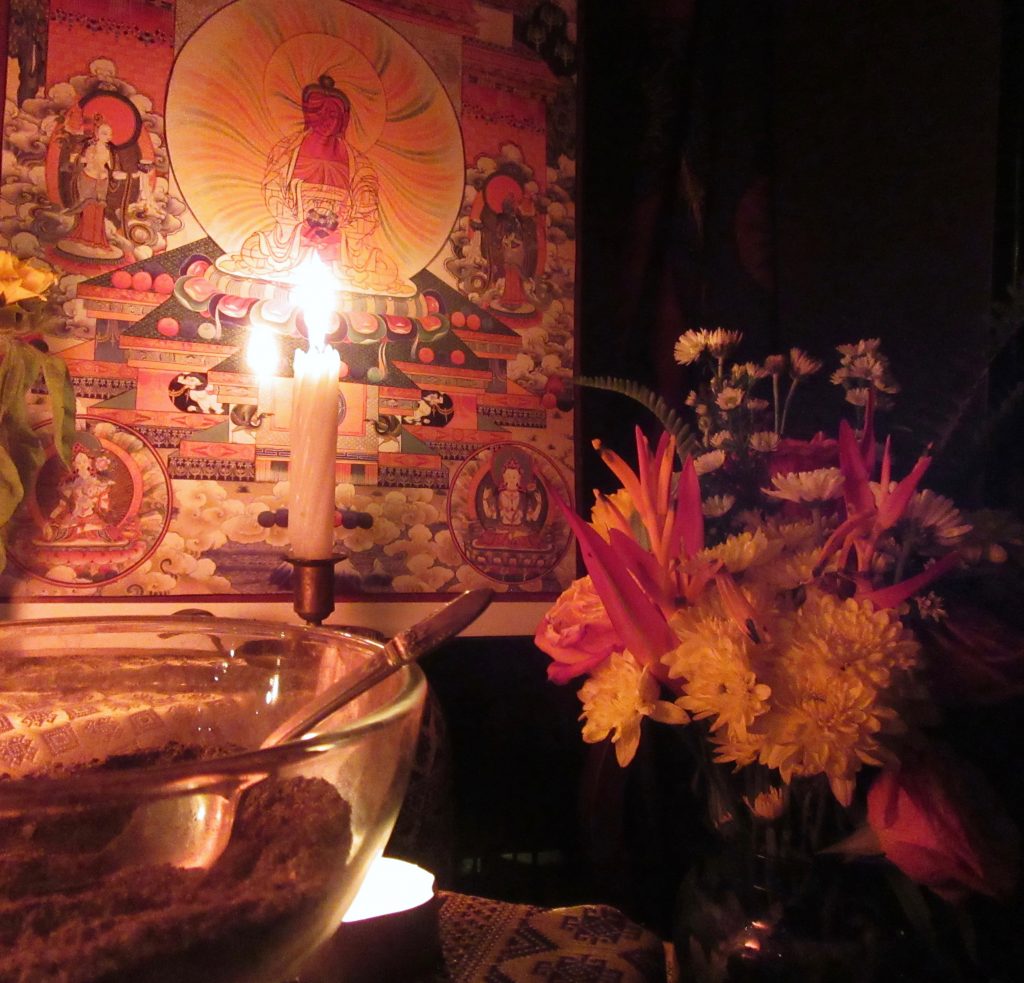
The Buddha Amitabha (in a thangka depicted in Celestial Gallery by Romio Shrestha) dissolves into rainbow light. At my altar during my bardo devotions. James’ ashes in the foreground.
The image of Buddha Amitabha’s translucent rainbow body reigned on my altar for many nights. I imagined dissolving into the clear rainbow light, letting go of egoic markers, of relaxing into my own greater nature. The Tibetan Tantric practices apply to the living, too.
During the bardo process, I had perceived that the man I knew as James was first lost, followed by an anxiousness to get on with his next incarnation. The Tibetan recommendation is to recognize your luminous self before opening the “womb door”, especially if you are weighted down with karma or fleeing perceived tormentors.
ཨོཾ་མ་ཎི་པདྨེ་ཧཱུྃ
It was the last night of the compassionate guides. When I turned the page, the next prayers would be for navigating through the bardo of the wrathful deities. I hesitated. Dawdling, I cleaned the altar, put fresh flowers, leafed through my books of Tibetan philosophy. I breathed and chanted. While in this trance state, I found myself reading a paragraph, which included some Tibetan script, that said that even if you had no Tantric master nor dharma brothers to support you, even if you had not studied the teachings nor dutifully meditated or done pranayama [breathwork], even if you had never heard of the bardo practices . . . if you had upheld your vows to Life and Truth during your incarnation, you could, in the moment, choose enlightenment in the bardos. It was like a backdoor way in.
Could it be? This flew in the face of the serious master-initiate commitment that is central to Vajrayana Buddhism. Only through years of training could the student attain the nondual realization that s/he and the deity/Buddha were one, not two.
Sitting silently in meditation, I recognized James’ unwavering vow to live an authentic life. After all, I had lived a large part of it with him. James the artist had destroyed paintings that he had painted for money, saving one to gift to a child. James the friend could be brutally honest, which repelled some but supported and inspired others. I was impressed in his memorial service to hear several people say, “He was my best friend.” James the life-partner had left me a few years prior to his death so he would not put me through his decline, so as to “not hold you back” or be an “obstacle” to Venus and Her Lover, he said. Granted, he did it in his Mars style ~ like a bull in a china shop ~ and our separation gave me a brutal tour of my own hell realms. But he saw to it that I would be fine on my own before he departed this plane.
The power of the vow . . . James’ devotion to the Truth guided his whole life. He would say, “I can’t say if my art is good or not. But it is real.” His Tantric practice was principally as appreciator of the Divine Feminine. When he was painting the 64 paintings for Venus and Her Lover, he often said, “I am on my knees to the Goddess.” He also had a special talent for recognizing the beauty and intelligence in his female friends … and told them so. He adored the Feminine.
So in that pause between the bardos, before I turned the page, I felt the fierceness of the Divine Masculine and thought: despite his rough and cantankerous nature, James had fulfilled his vows to Truth and to the Goddess, and that must be worth something! He had not followed any guru nor lineage, nor received the Tibetan teachings (though he did ask me to do the bardo practice for him), and refused most teachings in general, being pridefully auto-didactic. His acerbic observations made him a wise guy . . . and his words often revealed a wise man, too. In fact, some called him Baba.
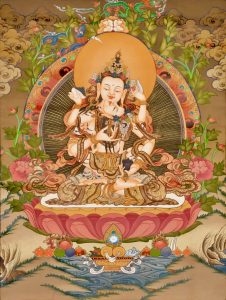
In my meditative state, my eyes floated open and rested upon a thangka depicting the Buddha Vajrasattva. There I saw James’ wide face, high forehead, and gentle blue eyes. He sat in yab-yum with his consort, emanating strength and benevolence. It was as if he winked at me with nondual humor. Mars & his Lover ~ the Buddha & his Dakini ~ the sacred union of Wisdom & Compassion that dissolves into the clear light of the One.
I had been chanting these many nights for him to recognize the parade of buddhas, dakinis, warriors, and other fanciful characters, and to learn from them. All that really needed to happen was for him to recognize his own Buddha nature ~ that which I was beholding now.
That night, I slept a full night’s sleep for the first time since his passing. The next day, I felt lighter. When it came time to approach my altar for the evening’s practice, I flipped through the Bardo Thötröl. Should I begin the next stage, diving into the realm of the wrathful deities? Or had James already made his decision? Where was he on his journey?
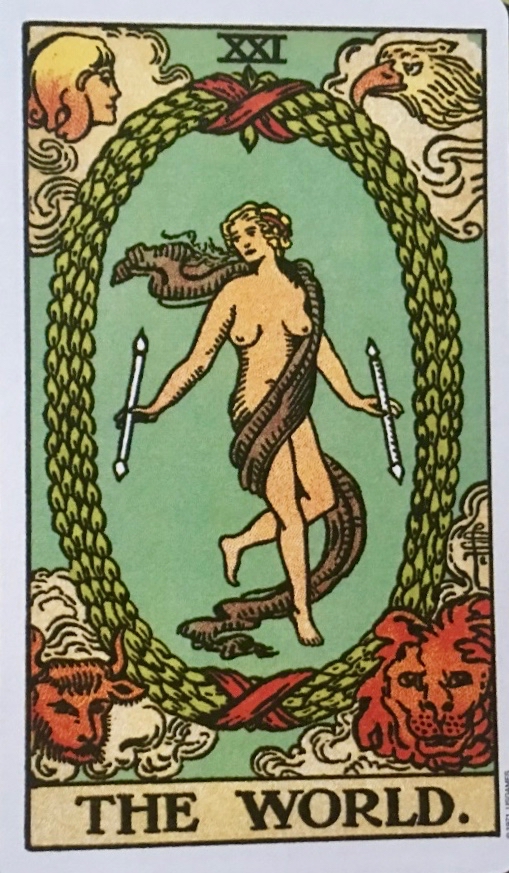
My hand bumped a stack of Tarot cards sitting on the altar, and one fell face up: The World. It is the culmination of the Major Arcana, the last stop on the evolutionary life-path depicted by the Tarot. It indicates completion, accomplishment, coming full circle.
I remembered seeing that image in a Tarot card reading James and I did with Ellen Goldberg, right before we jumped off on our around-the-world adventure of co-creating Venus and Her Lover. She warned us of risk and difficulties, but then read the last card, saying, “… but you will gain the World.”
That we did. And now, it seems, that James had completed his round. He had, for a fact, completed his life as James here on Earth. And perhaps ~ if I was reading the clues right ~ he had learned what he needed to learn and was ready for whatever he next would choose.
Some Tarot versions call this card The Universe. Later, James’ companion Laura told me she could finally sit again in meditation and that night, she felt James close to her. He took her hand, and they went flying through the Universe. It was vast and dazzling. She said the trip seemed quick, but when she opened her eyes, an hour had passed.

The day after The World card appeared, I did another round of bardo meditations about him attaining the clear light of the rainbow body. Could the power of the vow have worked for him? I reached for the book where I remembered reading the passage. It was not there. So I opened The Celestial Gallery (my big book of Tibetan thangkas) and read the commentary of the ones I had meditated with. Not there, either. I pulled out my books on Tibetan philosophy and searched. Nothing.
Did I hallucinate the whole experience? But … I remembered clearly how the page looked. Did I remote-view some ancient scroll hidden in the Himalayas? Had a new teaching slipped in?
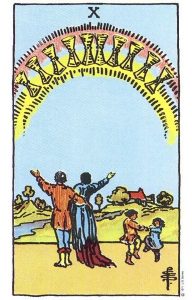
I now wondered if I could trust my perceptions about his bardo journey. “Will you dissolve into rainbow light, James?” I asked. “Where are you?” I picked a card. The Tarot answered with 10 of Cups.
It heralds a breakthrough or celebration of fulfilling one’s heart’s desires. The happy family is under the shimmering light of a rainbow. A rainbow.
I closed the book. Ostensibly, James saved me the trouble of the 49 days of chanting by exiting on the 12th day, on March 18th. It was a full moon, my father’s birthday, and (I would discover later) the day of the Buddhist lunar calendar when Buddha Amitabha’s compassionate grace was most easily accessible to even the uninitiated, if they called upon him with sincere desire … just as I was doing at my altar. Zen Buddhist scholar, Vajragoni, states that Amitabha’s Buddha-field “…is there for those whose journey towards Liberation needs further refinement. It’s like stopping off into a Cosmic Health-Spa for rest and spiritual rejuvenation.”3 This seemed like a perfect next stage for my Mars man.
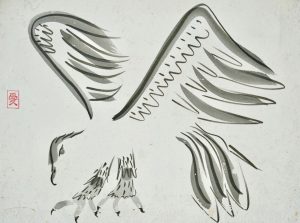
When James lived and painted in Japan, he took on the name Jamusu, which he had made into a woodblock that he used to sign his paintings. He told me that the symbols of the woodblock meant “flight” + “freedom”. Now I like to believe that James is on his freedom flight. All the arduous battling of the Warrior is done.
Finally, he is free . . . and shining like a rainbow.
~ निब्बान निब्बान निब्बान ~
Glossary
bardo བར་དོ་ཐོས་གྲོལ
the state of existence intermediate between two lives on Earth. According to Tibetan tradition, after death and before one’s next birth, when one’s consciousness is not connected with a physical body, one experiences a variety of phenomena.
dakini མཁའ་འགྲོ་མ་
Tantric deity described as a female embodiment of enlightened energy. She may act as a muse or practice partner in the meditations of Vajrayana Buddhism. Because she evokes the movement of energy in space (shunyata), she is referred to as Sky Dancer or Sky Walker.
dharma धर्म
Natural Law. Behaviors considered necessary for the maintenance of the natural order of things (ex: duty, vocation, spiritual practice and everything that is considered correct). Study of the teachings of ultimate reality and the propriety in actions that will lead to happiness, justice, social harmony, and reaching nirvana (personal liberation).
dharmatā ཆོས་ཉིད་
Suchness; isness; ultimate, absolute nature of reality completely free from conceptualization by the intellectual mind. Non-dual manifestation of nature.
karma कर्मन्
Effects of a person’s actions that determine his/her destiny in the next incarnation; destiny; fate. Law of cause and effect.
thangka ཐང་ཀ་
Tibetan silk painting with embroidery, usually depicting a Buddhist deity, scene, or mandala. Scroll painting. Principally used as a meditation tool to aid practitioners to visualize themselves as the deity and embody the Buddha qualities they desire or are studying.
yab-yum ཡབ་ཡུམ། (“father-mother”)
Male deity in sexual union with his female consort. The Buddha usually sits in a lotus position, with the dakini in his lap. In Tibetan Tantric symbology, it is the union of compassion/skillful means (Masculine Principle) and insight/wisdom (Feminine Principle). In the meditation practices of Vajrayana Buddhism, the practitioner transcends the polarity of duality and its attendant illusion of separateness in order to feel the mystical ecstasy of non-dual reality and enlightenment.
Citations
1 Fremantle, Francesa, and Chogyam Trungpa, translators, The Tibetan Book of the Dead ~ The Great Liberation through Hearing in the Bardo, p.53
2 Fremantle, Francesa, and Chogyam Trungpa, translators, The Tibetan Book of the Dead ~ The Great Liberation through Hearing in the Bardo


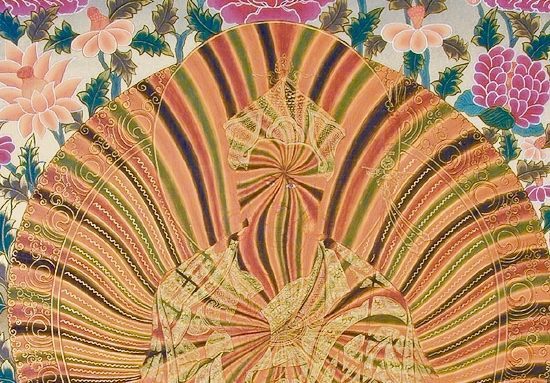
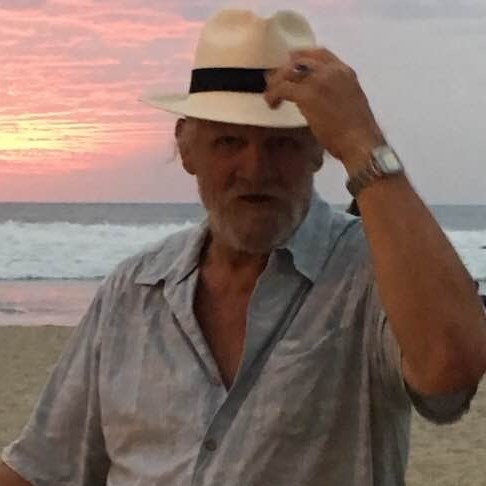
2 Comments
We are all moving inexorably towards a joyous meeting with James in the Amitabha Pure Lands.
May it be so. Unless, of course, James gets in a hurry to reincarnate … then we might have to recognize each other again, peering through all those samsaric veils of forgetting. How about, post-mortem, we all do a long weekend at that Cosmic Spa? How wonderful it must be to truly enJOY Existence in Sukhavati, the Blissful Realm of Amitabha Buddha!